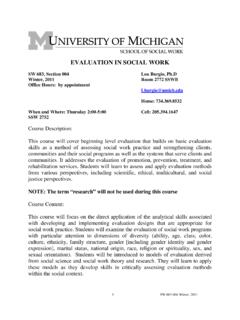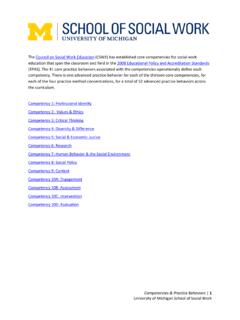Transcription of SW 696: Social Work Practice with Children and Youth
1 SW 696: Social work Practice with Children and Youth Fall 2013, Section 001. DIVISION: CHLDY. COURSE NUMBER: 696 Class room: B798. CREDIT HOURS: 3. PREREQUISITES: SW521 and SW560. : Required Practice course in the Children and Youth in Families and Societies Concentration INSTRUCTOR: Desmond Upton Patton, 734-736-6582, Office Hours: Wed- 10-12 or schedule another time at office 3838 SSWB. 1. Course Description: This advanced level methods course in the Children and Youth in Families and Societies concentration builds upon the foundation level Practice methods course and prepares students for employment in the many human service delivery systems which address the needs of Children , Youth , and their families. This cross-cutting skills course encompasses both direct/micro ( , assessment, intervention, prevention) and mezzo and macro (program design, evaluation, administration, community organization, policy analysis) Practice methods used to address problems presented by or to Children and Youth in a variety of contexts.
2 The development of Social work skills, values, and ethics applicable to promotion, prevention, intervention, remediation and Social rehabilitation activities with diverse child and Youth populations at all levels of intervention will be emphasized. Evidence-based change interventions that build on strengths and resources of Children and their families at all levels of intervention will be examined in order to develop socially just and culturally-competent policies and Practice . This course will address the key diversity dimensions (including ability, age, class, color, culture, ethnicity, family structure, gender (including gender identity and gender expression), marital status, national origin, race, religion or spirituality, sex, and sexual orientation) as it relates to Children , Youth and their families. 2. Course Content: Effective Social work Practice with Children and Youth requires a developmentally-sensitive, resiliency focused multisystems approach, an emphasis on prevention and early intervention, and the collaborative involvement of families, other primary caretaking adults, and involved professionals, in the identification, development, delivery, and evaluation of services.
3 In addition to being able to assess and intervene with Children and Youth , Social workers must also develop Page 1. the skills necessary to assess the resources and the risk factors which may exist in the child's or Youth 's family, neighborhood, community , and in the larger Social environment. In this course the emphasis of intervention is as much on the context as on the individual. Intervention strategies focus on ways to bring about change at levels such as the classroom or school, the peer group, and the community or population, as well as at the individual level. Mezzo and macro Practice skills covered in this course are aimed at promoting interpersonal competence, self- esteem, self-efficacy, achievement, and moral development in Children and Youth by making the contexts within which they develop more responsive to their developmental needs. Direct Practice methods covered in this course provide students with the skills necessary to select and provide effective short-term interventions, evaluate direct Practice , develop service delivery systems and work effectively with individuals, families and groups in families, institutions and communities.
4 Skills for engagement, assessment, intervention, prevention, and evaluation relevant to contexts such as families, neighborhood and community , schools, group care facilities, residential care, hospitals, correctional programs and institutions, courts, governmental and nongovernmental agencies will be covered. Intervention strategies may be derived from a variety of approaches and theoretical perspectives, self-help and peer support, group work , family life education, empowerment models, and family preservation. Students will learn to use evidence-based knowledge and skills to engage and communicate effectively with Children and Youth , families and community members, and other service providers. Assessment skills taught will emphasize the importance of being able to identify special needs, abuse and neglect, family violence, substance abuse, and circumstances of extreme stress, danger, or deprivation, and accurately assess the level of risk these circumstances present for the Children or youths concerned.
5 The student will learn how to design individual programs of intervention that are based on clearly articulated goals and priorities, reflect an examination of the evidence base and are consistent with Social work ethics and values. Throughout the course, cultural competence and sensitivity to differences among families and the impact of worker/client differences in values, experiences, and power will be analyzed. In addition, the student will learn to understand the significance of multiple identities (the interaction of factors such as the diverse dimensions: including ability, age, class, color, culture, ethnicity, family structure, gender (including gender identity and gender expression), marital status, national origin, race, religion or spirituality, sex, and sexual orientation) in shaping the uniqueness of families and individuals and in shaping power and privilege differences. Mezzo and macro Practice methods covered in this course include skills applicable to the areas of community organization and development, administration, policy and planning, and research and evaluation in order to support the strengths of diverse Children , families and communities and to promote Social justice.
6 Presentation of material from these areas recognizes the importance of working with multidisciplinary teams, service delivery agencies, and formal and informal community systems, in order to obtain necessary resources and support services for Children and Youth . Specific skills addressed include advocacy, needs assessment, working collaboratively with community agency and groups, administrative and supervisory issues impacting service delivery, budgeting and fiscal issues, program design and development, program and Practice research and evaluation, and child and Youth policy analysis. Page 2. 3. Course Objectives: 1. Students will demonstrate advanced-level skills in translating and applying a developmentally sensitive, resiliency focused, collaborative, multisystems intervention perspective in working with diverse populations of Children and Youth , families and communities. Effectively communicate with and establish developmentally sensitive, culturally appropriate collaborative relationships with Children , Youth , their families, and other significant members of their Social environments in every level of Social work intervention.
7 Develop and implement a Practice vision of Social justice Apply socially just interventions that maintain strengths-based and resiliency perspectives. Become familiar with belief systems and cultural practices of Children , Youth , and their families with whom they work by asking relevant questions in order to understand their needs within the context of these practices . Apply collaboration building and consultation skills within and across child and Youth serving organizations to strengthen families and organize communities in response to the program Practice and policy needs of diverse populations of Children and Youth in different child-serving settings. Specify how risks, protective and promotive factors that contribute to child and Youth safety, health, security and well-being. Effectively seek out needed information and become familiar with formal and informal resources available to meet the diverse needs of Children , Youth and their families. 2. Students will demonstrate advanced skill in using evidence-based prevention, intervention and rehabilitation Practice guidelines to develop micro, mezzo and macro interventions that address child, Youth , family and community goals and priorities.
8 Develop evidence-based change interventions that build on child, Youth , family and community strengths and resources at the micro, mezzo and macro system levels. Incorporate Social work values and ethical principles in planning and implementing interventions for Children and Youth and their families. Use relevant child, Youth and family policy initiatives, laws and judicial decisions to advocate for improvements in the delivery of interventions that support the strengths of diverse child, Youth , family, and community systems and promote Social justice. Develop and apply change interventions that a) differentiate within and between Social categories; b) maintain strengths-based and resiliency perspectives; c) promote dialogue across Social and cultural differences. Critique the applicability of current knowledge, research and evidence based Practice methods in work with diverse populations of Children , Youth and their families who live in communities where they experience discrimination and oppression due to the diversity dimensions.
9 Create a logic model or concept map describing connections between child, Youth , family and community focused Practice model with goals, objectives, activities, outcomes and evaluation approach. Page 3. 4. Course Design: This course instructor will select readings and design assignments for the course. Various classroom teaching strategies may be used, including lecture, multimedia presentations, small and large group discussion, presentations by students and guest lecturers, role plays, and experiential exercises. Students' experiences in the field will be utilized as much as possible in assignments and case presentations and discussions. 5. Relationship of Course to Four Curricular Themes: Multicultural and diversity issues will be emphasized throughout this course, not only in relationship to direct intervention with Children and Youth and their families and communities, but also in regard to the need to develop and maintain effective collaborative relationships with other community resources and service providers.
10 Students will learn to recognize the existence of group differences in a number of areas (such as nonverbal communication, individual and family values, family and community structures, preferred and accepted responses to crisis, response to exclusion or oppression) and how these may impact intervention relationships with Children , Youth , and their families. Social change and Social justice issues will be addressed in relationship to Children and Youth as populations who experience vulnerability due to developmental and status factors ( , age and dependence), in addition to other impacts they may experience due to membership in other groups which encounter exclusion and discrimination. In recognition of this, abuses of power within the family ( , domestic violence, physical and sexual abuse and exploitation) will be addressed as issues related to Social justice and human rights, and not just as indicators of individual and family psychopathology. Advocacy for Children and Youth , especially those whose families and communities are particularly impacted by Social inequality and Social injustice, will be emphasized at individual, family, organizational, community , and policy levels.



